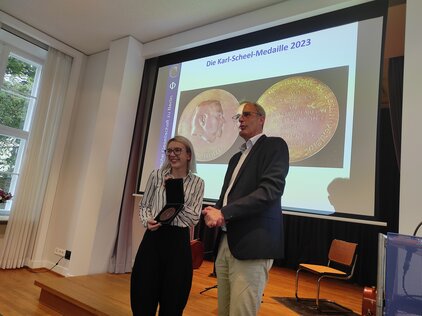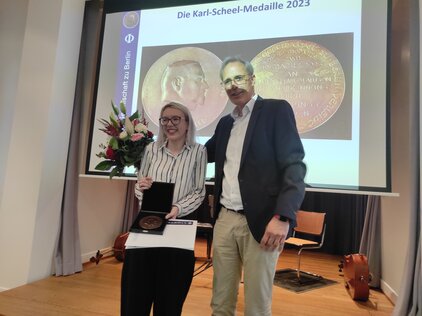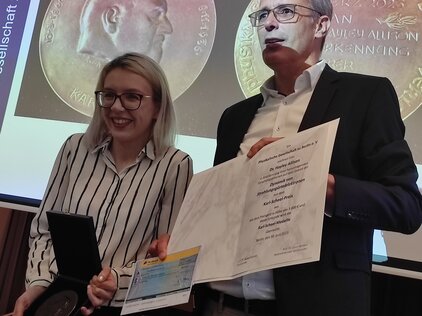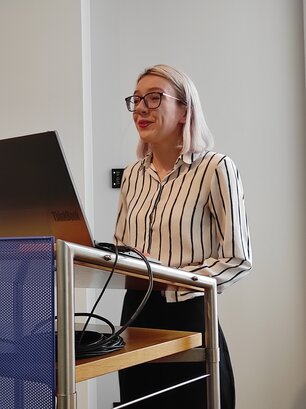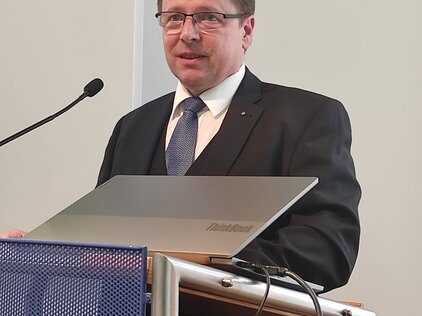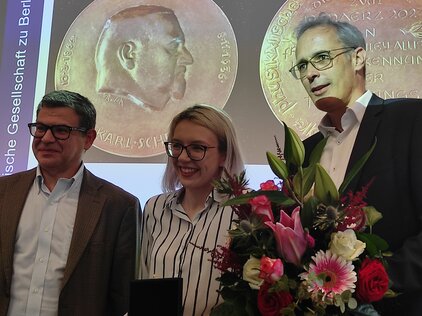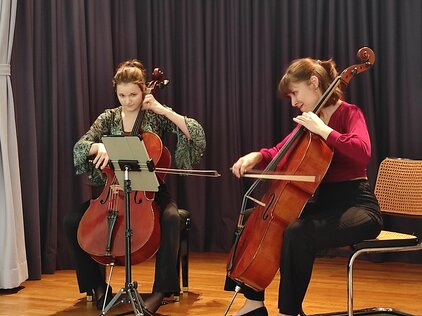Karl-Scheel-Sitzung und Preis 2023
Zeit
Moderation
Sprecher:innen
- Frau Dr. Hayley Allison
Ultra-relativistic Electron Acceleration in Earth’s Radiation Belts
Im Rahmen der Karl-Scheel-Sitzung 2023 wurde an
Frau Dr. Hayley Allison,
Helmholtz-Zentrum Potsdam, Deutsches GeoForschungsZentrum GFZ,
der Karl-Scheel-Preis 2023 verliehen.
Die Preisträgerin hielt einen Vortrag über ihre Forschungsergebnisse.
Im Anschluss erfolgte die Verleihung des Karl-Scheel-Preises an die Vortragende.
Earth's magnetic field hosts the Van Allen radiation belts, a region of harsh radiation, consisting of electrons and ions, that creates a hazardous environment for operating satellites. The number of electrons and the particle's energies are very dynamic, forced by changing solar wind conditions, and can vary by orders of magnitude in a matter of hours. Man-made satellites operate in the region of space covered by the Van Allen belts. Owing to the dynamic behaviour of the particles, electrons present a particular space weather challenge for satellite design and operations planning. The NASA Van Allen Probes satellite mission provides unique measurements of the radiation belt electrons at ultra-relativistic energies. Satellite measurements show that electrons in this region can have energies in excess of 7 MeV. However, the process by which electrons are energised to such ultra-relativistic energies has been the focus of much research. Typically, electrons in the radiation belts are accelerated either by local interactions with electromagnetic plasma waves, or by large scale motion across the magnetic field. Whether the electrons at ultra-relativistic energies are locally accelerated, arise from betatron and Fermi acceleration due to transport across the magnetic field, or if a combination of both mechanisms is required, has remained an unanswered question in radiation belt physics. We present a unique way of analysing satellite observations which demonstrates that local acceleration is capable of heating electrons up to 7 MeV. By considering the evolution of phase space density peaks in magnetic coordinate space, we observe distinct signatures of local acceleration and the subsequent outward radial diffusion of ultra-relativistic electron populations. Previous research has established the importance of naturally-occurring electromagnetic whistler mode chorus waves in locally energising electrons in the radiation belts. However, simulations have shown that interactions with solely chorus waves result in enhancements up to ~3 MeV, significantly less than 7 MeV. Observations of plasma waves allow for the routine inference of total plasma number density, a parameter that is challenging to measure directly. On the basis of long-term observations throughout 2015, we show that the underlying plasma density has a controlling effect over acceleration to ultra-relativistic energies, which occurs only when the plasma number density drops down to very low values (~10 cm–3). Such low density creates preferential conditions for local diffusive acceleration of electrons from hundreds of keV up to >7 MeV by whistler mode chorus waves. While previous models could not reproduce the local acceleration of electrons to such high energies, here we complement the observations with a numerical model to show that the conditions of extreme cold plasma depletion result in acceleration up to >7 MeV.
Karl-Scheel-Sitzung 2023 am 30. Juni 2023 um 17:15 Uhr im Magnus-Haus
Musikalischer Auftakt: Clara Eglhuber (Violoncello), Marei Schibilsky (Violoncello)
„El Choclo“ von Ángel Gregorio Villoldo
Grußwort von Dr. Lutz Schröter
Vizepräsident der Deutschen Physikalischen Gesellschaft (DPG)
Eröffnung der Karl-Scheel-Sitzung: Prof. Dr. Stefan Eisebitt
Vorsitzender der Physikalischen Gesellschaft zu Berlin (PGzB):
Karl Scheel und der Karl-Scheel-Preis der PGzB
Musikalisches Zwischenspiel: Clara Eglhuber (Cello), Marei Schibilsky (Cello)
Aus den 10 Duets for 2 Cellos: „3. Con Moto“ von Reinhold Gliére
Laudatio auf die Preisträgerin: Prof. Dr. Yuri Shprits
Helmholtz-Zentrum Potsdam, Deutsches GeoForschungsZentrum GFZ
Vortrag der Preisträgerin: Dr. Hayley Allison
Helmholtz-Zentrum Potsdam, Deutsches GeoForschungsZentrum GFZ,
Ultra-relativistic Electron Acceleration in Earth’s Radiation Belts
Verleihung des Karl-Scheel-Preises 2023 an Dr. Hayley Allison
Musikalischer Abschluss: Clara Eglhuber (Cello), Marei Schibilsky (Cello)
„Libertango“ von Astor Piazzolla
Im Anschluss lädt die PGzB alle Teilnehmende zu einem kleinen Empfang ein.
Impressionen von der Preisverleihung
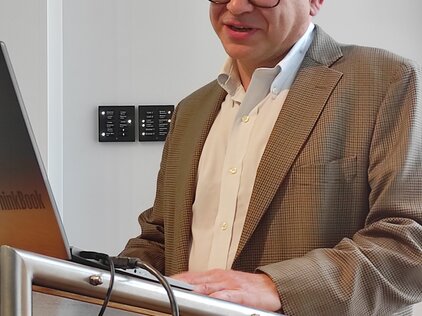
Helmholtz-Zentrum Potsdam, Deutsches GeoForschungsZentrum GFZ
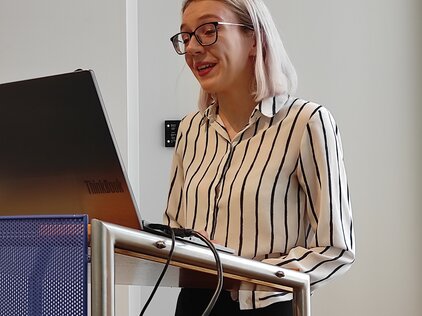
Helmholtz-Zentrum Potsdam, Deutsches GeoForschungsZentrum GFZ,
Ultra-relativistic Electron Acceleration in Earth’s Radiation Belts
